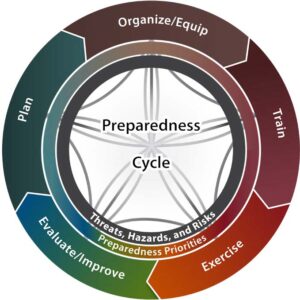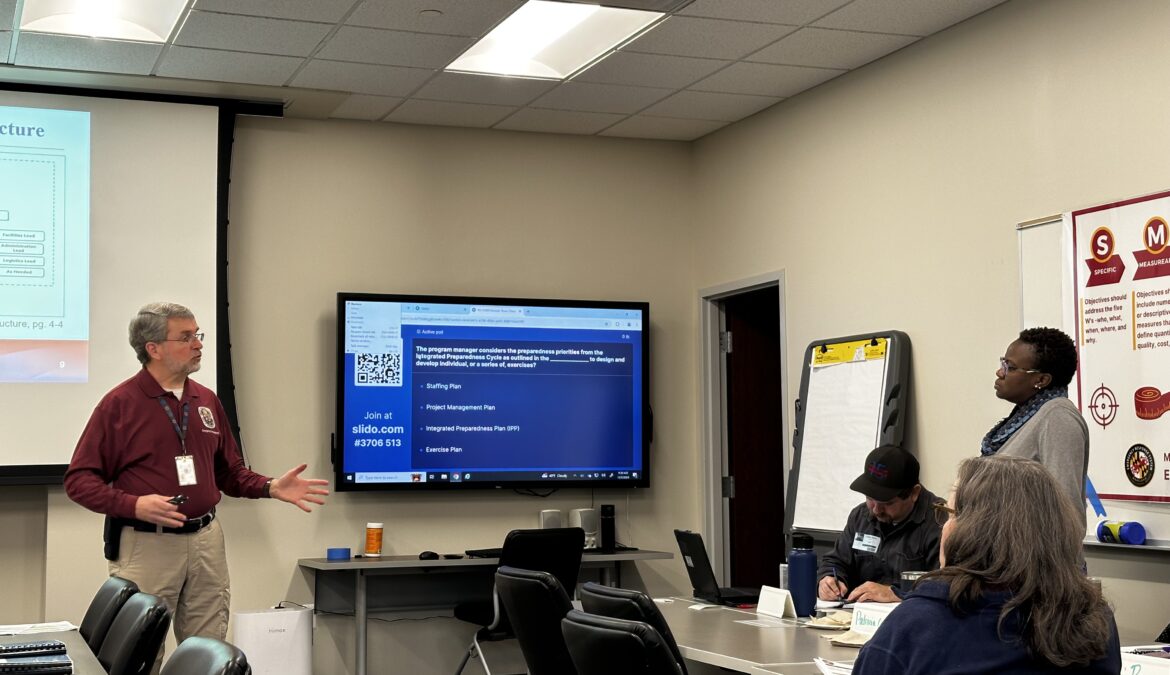This past December, the Maryland-National Capital Region Emergency Response System (MDERS) collaborated with the Prince George’s County Office of Homeland Security and Emergency Management (PG OHS/EM) to host an offering of the Homeland Security Exercise and Evaluation Program (HSEEP). The Federal Emergency Management Agency (FEMA) HSEEP course provides a framework for participants to effectively manage every facet of exercise planning. The collective approach from MDERS and PG OHS/EM allowed instructors to share valuable lessons in conjunction with the prescribed course materials. The fusion of personal subject matter expertise and FEMA’s curriculum provided attendees with invaluable knowledge to prepare them for overseeing the planning, execution, and evaluation of future exercises.
Man-made and natural threats pose a consistent danger to communities. To mitigate the damage from these emergencies, FEMA developed the Preparedness Cycle to best position jurisdictions to confront evolving disasters. Each aspect of the cycle is imperative, but HSEEP focuses on the cycle’s exercise and evaluation portion. Both discussion- and operations-based exercises are the key cog to testing the readiness of a community and/or departmental plan for a specific or nondescript emergency. The type, complexity, and resources required for each exercise vary greatly. HSEEP provides a baseline to prepare for each exercise type and consider the requirements needed to effectuate that exercise. At the conclusion of an exercise, a review and evaluation of the performance of exercise participants vis-à-vis the respective plan is critical to identify gaps and enhance the operational procedures within a community. Both phases inform the next step, planning, and reset the Preparedness Cycle.
jurisdictions to confront evolving disasters. Each aspect of the cycle is imperative, but HSEEP focuses on the cycle’s exercise and evaluation portion. Both discussion- and operations-based exercises are the key cog to testing the readiness of a community and/or departmental plan for a specific or nondescript emergency. The type, complexity, and resources required for each exercise vary greatly. HSEEP provides a baseline to prepare for each exercise type and consider the requirements needed to effectuate that exercise. At the conclusion of an exercise, a review and evaluation of the performance of exercise participants vis-à-vis the respective plan is critical to identify gaps and enhance the operational procedures within a community. Both phases inform the next step, planning, and reset the Preparedness Cycle.
The HSEEP course is a two-day lesson with this iteration held in a training room at PG OHS/EM’s office located in Hyattsville, Maryland. There are six modules, HSEEP Fundamentals, HSEEP Program Management, Exercise Design and Development, Exercise Conduct, Exercise Evaluation, and Improvement Planning, which  give a holistic understanding of the Exercise Cycle. Instruction was led by two representatives from PG OHS/EM and four representatives from MDERS. Each instructor was able to deliver the course materials with unique insight to impart valuable lessons to the attendees. Interspersed in each module are exercises that allowed the attendees to test the skills they have learned in each section. The exercises are a continuous development that helped attendees develop an exercise from inception to fruition. Lastly, the course culminated with a brief, mandatory test to ensure participants grasped the key principles of the course.
give a holistic understanding of the Exercise Cycle. Instruction was led by two representatives from PG OHS/EM and four representatives from MDERS. Each instructor was able to deliver the course materials with unique insight to impart valuable lessons to the attendees. Interspersed in each module are exercises that allowed the attendees to test the skills they have learned in each section. The exercises are a continuous development that helped attendees develop an exercise from inception to fruition. Lastly, the course culminated with a brief, mandatory test to ensure participants grasped the key principles of the course.
MDERS was pleased to continue to partner with PG OHS/EM to collectively teach an offering of HSEEP. The partnership underscores the strong relationships and continuous support that MDERS provides to our stakeholders.
For more information on HSEEP, please click this link.
Reference
U.S. Department of Homeland Security. (2020, January). Homeland Security Exercise and Evaluation Program (HSEEP). Retrieved from Homeland Security Exercise and Evaluation Program (HSEEP) (fema.gov)



